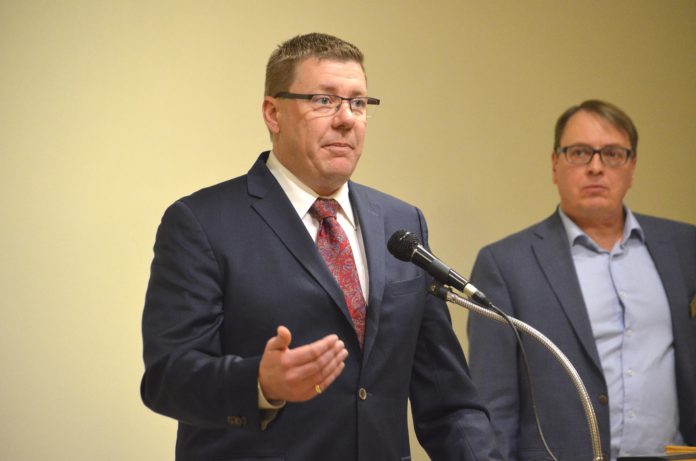
Saskatchewan’s municipalities will have access to more provincial dollars for 2019-20 thanks to changes to the province’s municipal revenue sharing program.
Premier Scott Moe announced that municipalities will receive revenue sharing of three-quarters of one per cent of the PST.
That will bring the total amount of revenue sharing to $251 million for the next fiscal year, an overall funding increase of more than $10 million, or four per cent, form the current fiscal year.
The program will also see $1.5 million from the revenue sharing amount co-managed with municipalities to “invest in initiatives that support good governance, capacity building and regional planning,” the province said in a press release.
Moe made the announcement during the second day of the Saskatchewan Urban Municipalities Association (SUMA) annual convention, being held in Saskatoon this week.
The revenue sharing program was reviewed and municipalities consulted beginning in 2018. It’s distributed on a per capita basis, and there are no requirements as to how the funds need to be spent.
Municipal revenue sharing had been frozen at about $241 million this year. The earlier system peaked at $271 million in 2016-17. Previously, it was based on one point of PST revenue. Since then, though, PST has been increased from five to six per cent, and some tax exemptions, like for construction, removed. Those changes led to the PST increasing to $2 billion last year from $1.2 billion the year before.
According to the provincial government, the new formula is predictable, transparent and sustainable.
‘We came to the conclusion that this gives … a reasonable lift,” Moe told reporters Monday.
“It was frozen last year and has fluctuated with the PST up and down in years gone by. This … is a reasonable increase as we go forward.”
Moe said a predictable revenue sharing formula was desired by municipalities.
The mayors of the two largest cities expressed their support for the decision.
Saskatoon Mayor Charlie Clark called the formula a “good step forward,” while Regina Mayor Michael Fougere called it “good news for cities and town and villages right across the province.
“What I’m glad to see is that it didn’t go down and there’s going to be some growth,” Clark said, adding that the money will help offset revenues lost when the province cut and then partially restored Crown corporation grants.
Prince Albert Mayor Greg Dionne wasn’t available for comment.
But while the mayors seemed receptive of the news, not everyone was happy.
The provincial NDP said the announcement wasn’t good enough and called on the Sask. Party to restore the revenue sharing to one percentage point of the PST.
“I know a lot of the municipal leaders in attendance weren’t completely happy with the announcement,” said Prince Albert Northcote MLA Nicole Rancourt, who was in Saskatoon for the premier’s announcement.
“They didn’t feel like they got what they were hoping for with regards to the restructuring of the revenue sharing.”
Rancourt argued that municipalities are dealing with increased costs due to the increase of the PST, inflation and a growing population.
In a press release, the NDP pointed to the suspension of the Community Rink Affordability Grant, cuts to regional parks, the suspension of the Main Street Saskatchewan Program and money cut from the Urban Highway Connector Program as “examples of the Sask. Party’s mistreatment of municipalities.”
One area where the opposition and the municipalities agree is in regards to the sharing of cannabis tax revenue.
It was an issue Dionne addressed in his State of the City address last week, and a concern echoed by Rancourt Monday.
“Municipalities are wondering when they will be getting their fair share of the cannabis revenue,” she said.
The federal government keeps 25 per cent of cannabis excise tax revenues and forwards the remaining 75 per cent to the province. The intention was a large portion would go to municipalities and local communities, which bear many of the costs of legalization. So far, though, Saskatchewan hasn’t shared any of its revenues with municipalities, a decision Moe defended Monday.
“There hasn’t been very much in the way of revenues (from cannabis) as of yet, although there has been a fair amount of expense,” he said.
“At this point in time, we’re not open to that discussion, but we’re always open to having that discussion with our municipalities.”
Moe said that the province’s expenses for now “far exceed” any revenues and that as they move forward, they’ll see where that budget line is at. The last provincial budget didn’t include any projections for revenues or expenses as it was unknown where those dollar amounts would fall.
“We’ll see where those land in the years ahead,” Moe said.
“There just isn’t a lot of revenue to talk about. Right now, it is what it is.”
Moe recommits to balanced budget
The premier reaffirmed his government’s commitment to a balanced budget by the spring.
The mid-year financial update projected a small surplus after a few years of deficit spending. Moe promised the 2019-20 budget would be balanced.
“We had some challenging decisions we had to make just over two years ago,” Moe told reporters Monday, referencing the expansion of the PST.
“Those were not easy decisions to make, but they were made within that balanced budget, which we will be introducing … this spring. That was always the goal and that is still the intent.”
Moe had previously promised a new, fully-funded hospital for Prince Albert when the budget was back in balance. Dionne is hopeful more details will come this spring.
However, the Sask. Party has revised the timeline to “when finances permit,” and has contracted out a third party to review whether a rebuild or redevelopment makes the most economic sense. That report is also due this spring.
One of Dionne’s stated goals for the SUMA convention is continuing to advocate for the new hospital.
— With files from Alex MacPherson, Saskatoon StarPhoenix

